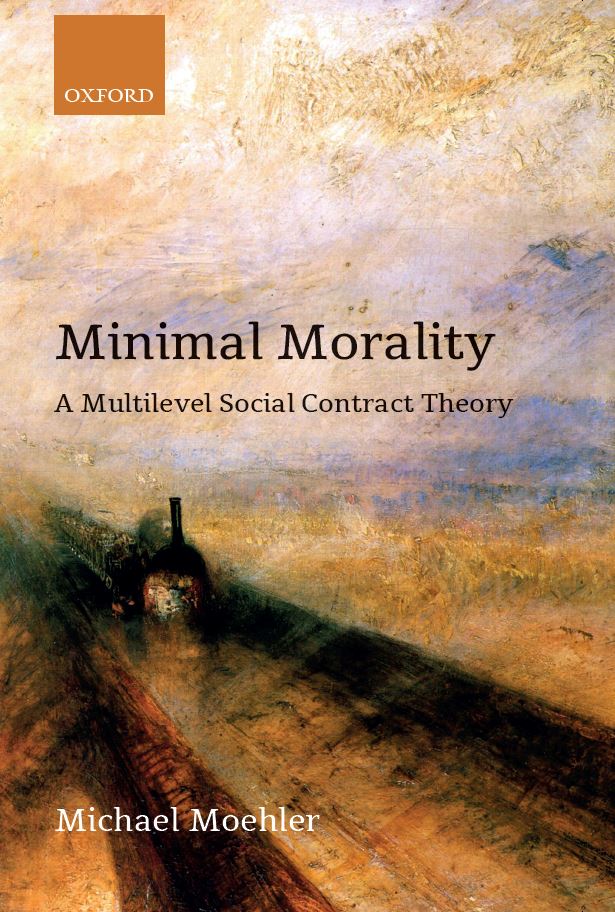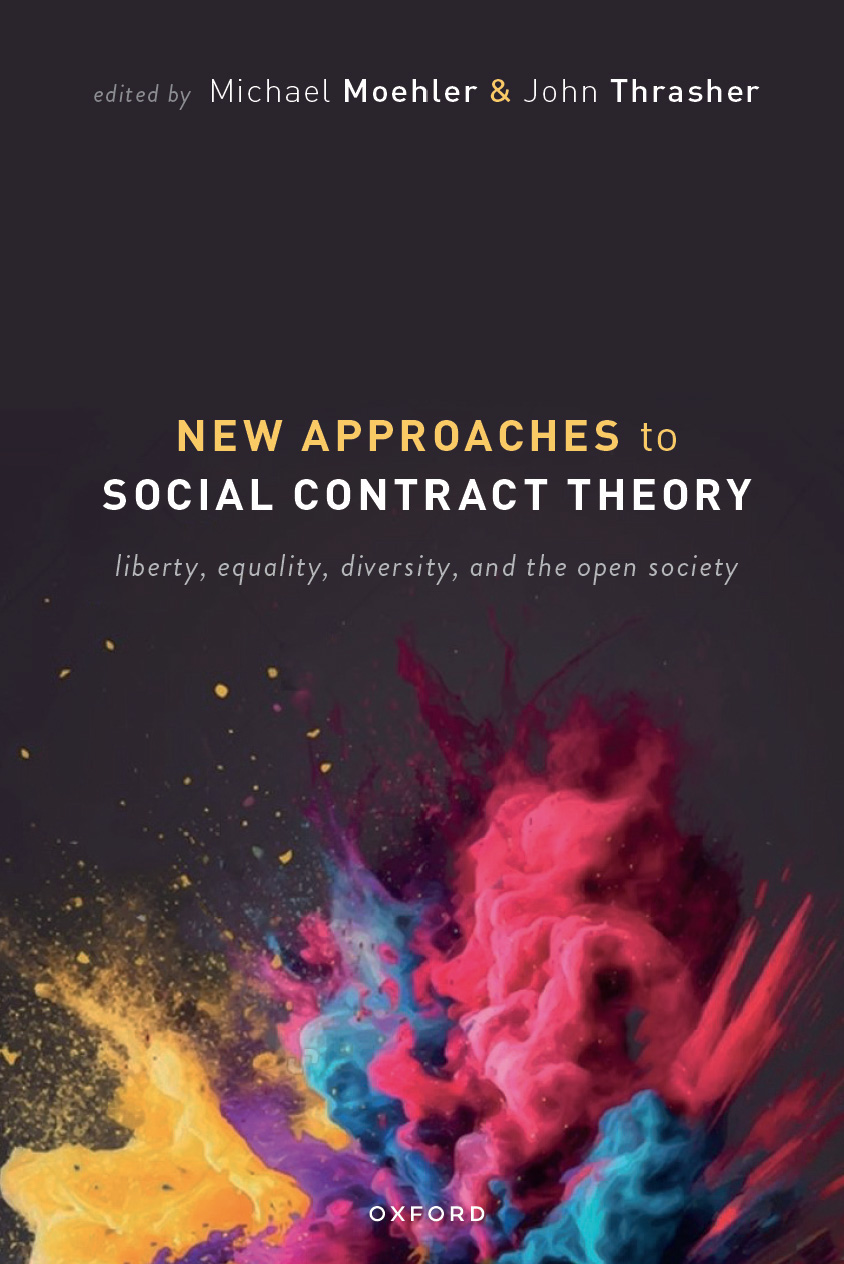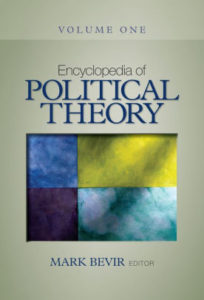A. BOOKS: Monographs, Edited Volumes, and Collections
New Approaches to Social Contract Theory: Liberty, Equality, Diversity, and the Open Society
Oxford: Oxford University Press. 2024. With John Thrasher.
This book features new approaches to social contract theory. Whereas traditional social contract theories and their adaptations in the twentieth century were developed for fairly homogeneous societies, societies in the twenty-first century often are characterized by conflicting first-order directives that stem from deep moral, political, religious, and cultural diversity. To address such diversity and the complexities of contemporary societies, new approaches (including formal approaches) to social contract theory have emerged that re-envision the social contract for a fragmented and sometimes polarized, yet interdependent social world. New social contract theory explores how, in a world of continuous disagreement on questions of justice, in particular the ideals of liberty and equality, society can not only progress, but also flourish and become more robust and open in its social fabric. This book brings together, for the first time, defenders and discussants of new social contract theory. It includes contributions by eminent and emerging scholars in this field. The book clarifies the distinct features of new social contract theory and provides a valuable starting point for discussion of this novel movement in social contract theory.
Distinct features.
1. Discusses new approaches to social contract theory that capture the diversity and complexity of contemporary societies.
2. Highlights the challenges associated with ongoing disagreements about questions of justice, and the role that justice plays in diverse societies.
3. Demonstrates the value and importance of interdisciplinary research methods in philosophy, politics, and economics for addressing core challenges of the twenty-first century.
4. Clarifies the distinct features of new social contract theory and provides a valuable starting point for discussion of this novel movement in social contract theory.
Contents.
1. New Social Contract Theory (Michael Moehler and John Thrasher)
2. Introducing Realistic Power Relations Into the New Social Contract (S. A. Lloyd)
3. A Realist Social Contract (Christopher W. Morris)
4. Naturalism Versus Realism in Social Contract Models (Ken Binmore)
5. Robust Reconciliation (Alexander Schaefer)
6. Diversity, Polarization, and Dynamic Structures (Sahar Heydari Fard)
7. Why Natural Social Contracts Are Not Fair (Cailin O’Connor)
8. Justice and Equality From Rationality Alone (Alexis Louaas)
9. Bargaining, Diversity, and the Veil (Justin Bruner)
10. Harnessing Diversity, Dynamism, and Discovery (Ryan Muldoon)
11. Consensus, Contract, and Diversity (John Thrasher)
12. Diversity, Polycentricity, Justice, and the Open Society (Michael Moehler)
13. Can the Liberty of Subjects Protect Against Tyranny and Corruption in Government? (Claire Finkelstein)
Strategic Justice, Conventions, and Game Theory
London/Berlin/New York: Springer. 2022. Synthese Collection. With John Thrasher.
For more than twenty years, Peter Vanderschraaf’s work has combined rigorous game-theoretic analysis, innovative use of (social) scientific method, and normative analysis in the context of the social contract. Vanderschraaf’s work has influenced a significant interdisciplinary field of study and culminated in the publication of his book, Strategic Justice: Convention and Problems of Balancing Divergent Interests (OUP, 2019). Building upon his previous work, Vanderschraaf developed a new theory of justice (justice-as-convention) that, despite a mutual advantage approach, considers the most vulnerable members of society and defends the egalitarian bargaining solution. To advance his theory, Vanderschraaf proposes an account of conventions that updates and systematizes David Lewis’s account of conventions, drawing on contemporary developments in game theory and economics. This topical collection brings together game theorists, philosophers, economists, and political scientists to discuss themes from Vanderschraaf’s work. The collection bridges a gap among disjoint but closely related literatures in game theory, bargaining theory, formal philosophy, rationality, equality, justice, and the social contract in order to advance dialogue among scholars in this rich and growing field of study.
Contents.
Conventions, Morals and Strategy: Greta’s Dilemma and the Incarceration Game (Kaushik Basu)
Sharing with the Vulnerable? (Lina Eriksson)
Strategic Injustice, Dynamic Network Formation, and Social Movements (Sahar Heydari Fard)
Exit and Isolation: Rousseau’s State of Nature (Mario I. Juarez-Garcia and Alexander Schaefer)
Interests From and in Conventions (C. M. Melenovsky)
Strategic Justice, Conventionalism, and Bargaining Theory (Michael Moehler)
Quasi-Conventions (Brian Skyrms)
Three Vulnerability Objections to Justice as Mutual Advantage (Chad Van Schoelandt)
The Silver Bullet: Justice as Mutual Advantage and the Vulnerability Objection (Jeppe von Platz)
Contractarianism
Cambridge: Cambridge University Press. 2020.
 This book provides a systematic defense of moral contractarianism as a distinct approach to the social contract with particular relevance for morally diverse societies. In modern philosophy, the position of moral contractarianism has been advanced most notably by Hobbes (1651), Hampton (1986), Kavka (1986), Gauthier (1969, 1986), and Moehler (2018). This book elucidates, in comparison to moral conventionalism and moral contractualism, the distinct features of moral contractarianism, its scope, and conceptual and practical challenges that concern the relationship between morality and self-interest, the problems of assurance and compliance, rule-following, counterfactualism, and the nexus between morals and politics. In addition, the book offers a qualified defense of the use of formal methods, such as decision theory and game theory, in moral philosophy. The book argues that, if appropriately conceived, moral contractarianism is conceptually coherent, empirically sound, and practically relevant, and has much to offer to contemporary moral philosophy.
This book provides a systematic defense of moral contractarianism as a distinct approach to the social contract with particular relevance for morally diverse societies. In modern philosophy, the position of moral contractarianism has been advanced most notably by Hobbes (1651), Hampton (1986), Kavka (1986), Gauthier (1969, 1986), and Moehler (2018). This book elucidates, in comparison to moral conventionalism and moral contractualism, the distinct features of moral contractarianism, its scope, and conceptual and practical challenges that concern the relationship between morality and self-interest, the problems of assurance and compliance, rule-following, counterfactualism, and the nexus between morals and politics. In addition, the book offers a qualified defense of the use of formal methods, such as decision theory and game theory, in moral philosophy. The book argues that, if appropriately conceived, moral contractarianism is conceptually coherent, empirically sound, and practically relevant, and has much to offer to contemporary moral philosophy.
Contents.
1. Introduction
1.1 Contractarian Moral Theory
1.2 Core Features of Moral Contractarianism
1.3 Core Challenges for Moral Contractarianism
2. The State of Nature and Social Moral Order
2.1 Rational Choice Theory and Moral Philosophy
2.2 The State of Nature and Assurance
2.3 The Social Contract and Compliance
3. Moral Principles and Decisions
3.1 Bargaining Theory and Morality
3.2 The Rationale for Rule-Following
3.3 Moral Original Positions
4. A Reconciliation of Contractarian Moral Theory
4.1 Moral Diversity and Multilevel Theory
4.2 Moral Agency, Autonomy, and Compliance
4.3 Contractarianism and Moral Philosophy
Minimal Morality: A Multilevel Social Contract Theory
Oxford: Oxford University Press. 2018.
 This book develops a novel multilevel social contract theory that, in contrast to existing theories in the liberal tradition, does not merely assume a restricted form of reasonable moral pluralism, but is tailored to the conditions of deeply morally pluralistic societies which may be populated by liberal moral agents, nonliberal moral agents, and, according to the traditional understanding of morality, nonmoral agents alike. The book draws on the history of the social contract tradition, especially the work of Hobbes, Hume, Kant, Rawls, and Gauthier, as well as on the work of some of the critics of this tradition, such as Sen and Gaus. The two-level contractarian theory holds that morality in its best contractarian version for the conditions of deeply morally pluralistic societies entails Humean, Hobbesian, and Kantian moral properties. The theory defines the minimal behavioral restrictions that are necessary to ensure, compared to violent conflict resolution, mutually beneficial peaceful long-term cooperation in deeply morally pluralistic societies. The theory minimizes the problem of compliance for morally diverse societies by maximally respecting the interests of all members of society. Despite its ideal nature, the theory is, in principle, applicable to the real world and, for the conditions described, most promising for securing mutually beneficial peaceful long-term cooperation in a world in which a fully just society, due to moral diversity, is unattainable. If Rawls’ intention was to carry the traditional social contract argument to a higher level of abstraction, then the two-level contractarian theory brings it back down to earth.
This book develops a novel multilevel social contract theory that, in contrast to existing theories in the liberal tradition, does not merely assume a restricted form of reasonable moral pluralism, but is tailored to the conditions of deeply morally pluralistic societies which may be populated by liberal moral agents, nonliberal moral agents, and, according to the traditional understanding of morality, nonmoral agents alike. The book draws on the history of the social contract tradition, especially the work of Hobbes, Hume, Kant, Rawls, and Gauthier, as well as on the work of some of the critics of this tradition, such as Sen and Gaus. The two-level contractarian theory holds that morality in its best contractarian version for the conditions of deeply morally pluralistic societies entails Humean, Hobbesian, and Kantian moral properties. The theory defines the minimal behavioral restrictions that are necessary to ensure, compared to violent conflict resolution, mutually beneficial peaceful long-term cooperation in deeply morally pluralistic societies. The theory minimizes the problem of compliance for morally diverse societies by maximally respecting the interests of all members of society. Despite its ideal nature, the theory is, in principle, applicable to the real world and, for the conditions described, most promising for securing mutually beneficial peaceful long-term cooperation in a world in which a fully just society, due to moral diversity, is unattainable. If Rawls’ intention was to carry the traditional social contract argument to a higher level of abstraction, then the two-level contractarian theory brings it back down to earth.
Contents.
1. Introduction
1.1 The Project
1.2 Outline of the Book
1.3 Methodological Considerations
2. Rational Choice Contractarianism
2.1 Hobbes’ Moral and Political Contractarianism
2.2 Gauthier’s Morals by Agreement
2.3 Gauthier’s New Social Contract Theory
3. Rational Choice Contractualism
3.1 The Rawls–Harsanyi Dispute
3.2 Rawls’ Original Position Argument
3.3 Moral Implications of the Rawls–Harsanyi Dispute
4. Pure Instrumental Morality
4.1 The Homo Prudens Model
4.2 Empathetic Contractor Theory
4.3 The Weak Principle of Universalization
5. Two-Level Contractarian Moral Theory
5.1 Traditional First-Level Morality
5.2 Two-Level Moral Theory
5.3 Minimal Morality at Work
6. Morals and Politics
6.1 A Democratic Productivist Welfare State
6.2 The Aristotelian Principle, Productivity, and Equality
6.3 Global Justice and Peaceful Cooperation
Endorsements.
“The pressing question for today’s social philosophy is the basis of cooperation in our morally fractured societies. Minimal Morality develops a sophisticated Hobbesian-inspired analysis to defend an original and insightful answer. When our differences are so deep that even public reason and traditional social contract theories fail to articulate a justified moral framework, Michael Moehler proposes a ‘minimal morality’ among prudent individuals. This is a wonderful and important book, providing a masterful restatement of rational choice moral theory.” (Gerald Gaus, University of Arizona, book cover)
“Michael Moehler breathes new life into contractarian moral philosophy, enlisting not only Gauthier and Rawls, but borrowing as well from Hobbes, Hume, and Kant. The result is a strikingly innovative social contract theory … There is more that Moehler can do with his innovative two-level moral theory. His excellent book is an invitation to write another.” (Christopher W. Morris, University of Maryland, book cover and Analytic Philosophy)
“In many ways Minimal Morality is, I think, a stunning success. Indeed, I taught it in a graduate seminar at the University of Maryland this past spring semester alongside A Theory of Justice, What We Owe to Each Other, and Morals by Agreement, where I think it plausibly belongs.” (Brian Kogelmann, University of Maryland, Economics and Philosophy)
“One can view Moehler’s Minimal Morality project as providing an important alternative to earlier theories that address the moral pluralism problem, such as Rawls’ (1971) and Scanlon’s (1982) contractualist theories … I think one can view Moehler’s project in a different and equally fruitful way, as presenting a striking new approach to incorporating instrumental rationality in moral theory.” (Peter Vanderschraaf, University of Arizona, Analytic Philosophy)
“To summarize, there is too much morality and the discussion of application is too minimal. That said, this is a tremendous book. It covers considerable ground and takes on the hardest and, to my mind, the most important questions of moral and political thought. If my concerns make it seem like I think Moehler has been unsuccessful in answering these questions, this would only put him [in the] same company as all who have come before him. But, ultimately, I do not think Moehler has been unsuccessful … Moehler’s innovation of multilevel contractualism is a very important development that, I suspect, will be the real, enduring legacy of this work.” (John Thrasher, Chapman University, Analytic Philosophy)
Reviews and discussions.
Kogelmann, Brian, Economics and Philosophy 35 (2019): 173-179.
Gaus, Gerald, “Moral Conflict and Prudential Agreement: Michael Moehler’s Minimal Morality,” Analysis 79 (2019): 106-115.
Cooper, Dominick, “The Weak Principle of Universalization and the Vulnerable: Comments on Minimal Morality,” Analysis 79 (2019): 116-128.
Van Schoelandt, Chad, “Between Traditional and Minimal Moralities,” Analysis 79 (2019): 128-140.
D’Agostino, Fred, “Pluralism, Prudence, and Political Theory: Comments on Minimal Morality by Michael Moehler” Analytic Philosophy 61 (2020): 37-45.
Thrasher, John, “On Minimal Morality,” Analytic Philosophy 61 (2020): 46-56.
Morris, Christopher W., “Morality’s Many Parts: Symposium on Michael Moehler’s Minimal Morality,” Analytic Philosophy 61 (2020): 57-69.
Vanderschraaf, Peter, “Stability Challenges for Moehler’s Second-Level Social Contract,” Analytic Philosophy 61 (2020): 70-86.
Messina, J.P. and David Wiens, “Morals from Rationality Alone? Some Doubts,” Politics, Philosophy and Economics 19 (2020): 248-273.
Louaas, Alexis, “Justice and Equality from Rationality Alone – A Repeated Game Approach to Contractarianism,” in Michael Moehler and John Thrasher (eds.), New Approaches to Social Contract Theory: Liberty, Equality, Diversity, and the Open Society (Oxford: Oxford University Press, 2024). 141-163.
Sudarshan, Saranga, Journal of Moral Philosophy 19 (2022): 201-204.
Précis and responses.
Moehler, Michael, “Summary of Minimal Morality: A Multilevel Social Contract Theory,” Analysis 79 (2019): 103-105.
Moehler, Michael, “Replies to Gaus, Van Schoelandt and Cooper: Prudence, Morality and the Social Contract,”
Analysis 79 (2019): 140-153.
Moehler, Michael, “Minimal Morality, Bargaining Power, and Moral Constraint: Replies to D’Agostino, Thrasher, Morris, and Vanderschraaf,” Analytic Philosophy 61 (2020): 87-100.
Moehler, Michael, “Contractarianism: Morality, Rationality, and the Context of Choice,” Œconomia 13 (2023): 1-22.
B. BOOK CHAPTERS
Social contract theory enjoys a long history in moral and political philosophy. Since the European Enlightenment, social contract theory has become one of the most important traditions in moral and political philosophy. This chapter provides a brief introduction to central concepts in social contract theory and their development over time. Most importantly, the chapter clarifies some of the distinct features of new approaches to social contract theory (or “new social contract theory” for short) that have evolved in the twenty-first century and are most suitable for capturing the circumstances of contemporary societies, even if new social contract theory does not constitute a unified theoretical position but is best considered as a family of approaches, methods, and topics. The chapter also provides an overview of the contributions to this book and their connections both methodologically and thematically.
Keywords: new social contract theory, diversity, polarization, social order, justice, rationalism, empiricism, idealism, realism.
Diversity, Polycentricity, Justice, and the Open Society
In New Approaches to Social Contract Theory: Liberty, Equality, Diversity, and the Open Society. Oxford: Oxford University Press. 2024. 227-251.
Moral diversity poses significant challenges for normative theory building, because no particular conception of justice may be agreeable to all members of society. Polycentrism offers a potential solution by allowing a plurality of local regulative principles. For deeply diverse societies, however, polycentrism fails conceptually. This chapter argues that Moehler’s (2018) multilevel social contract theory can overcome this problem. The theory disposes the quest for justice as the sole and exclusive objective and considers agents’ liberty and peaceful interaction as the primary goals of (new) social contract theory and the basis for an open society. To clarify its nature, the chapter contrasts the vision of the open society provided by Moehler’s theory with the vision provided by Gaus’s (2021) theory. Both theories move beyond polycentrism and offer promising versions of a ‘new social contract’ that shows how diverse societies can progress and become more robust and open in their social fabric.
Keywords: moral diversity, polycentrism, social order, liberty, justice, peaceful cooperation, open society, Hume, Hayek, Gaus.
Contractarianism and Climate Change
In Moral Theory and Climate Change: Ethical Perspectives on a Warming Planet. London: Routledge. 2020. 139-156.
Contemporary moral contractarianism originates with Hobbes’s moral theory. When considering the structure of Hobbes’s moral theory, however, it is often argued that moral contractarianism does not justify any specific moral demands concerning questions of climate change because currently no global Leviathan in Hobbes’s sense exists that could enforce any such demands in our world. I do not dispute the fact that currently no global Leviathan in Hobbes’s sense exists in our world. Nevertheless, I argue that Hobbesian moral contractarianism offers an adequate moral framework to guide our considerations concerning questions of climate change. Methodologically, the approach is sufficiently pluralistic to consider ethical and economic considerations as well as political feasibility constraints. Conceptually, I argue that, despite the fact that currently no global Leviathan in Hobbes’s sense exists in our world, a Hobbesian-inspired modus vivendi is sufficient as a starting point to address some of the most pressing issues of climate change in our world. Specifically, I argue that the shift in climate change negotiations from the Kyoto Protocol to the Paris Agreement could be considered to be guided by reasoning that underlies Hobbesian moral contractarianism.
Neoclassical Economics
In Encyclopedia of Political Theory, Vol 2. London: SAGE Publications. 2010. 946-951. With Geoffrey Brennan.
The term neoclassical economics delineates a distinct and relatively homogenous school of thought in economic theory that became prominent in the late nineteenth century and that now dominates mainstream economics. The term was originally introduced by Thorstein Veblen to describe developments in the discipline (of which Veblen did not entirely approve) associated with the work of such figures as William Jevons, Carl Menger, and Leon Walras. The ambition of these figures, the first neoclassicists, was to formalize and mathematize the subject in the aftermath of the so-called marginalist revolution. Economics is, according to one definition, the science that studies human behavior as a relationship between ends and scarce means that have alternative uses. Neoclassical economics pursues this study by means of supply and demand models that determine prices based on the subjective preferences of producers and consumers. Neoclassical economics relies on subjective preferences for determining prices in order to escape from the so-called objective value theory of classical economics, according to which the value of goods could be established by reference to some basic commodity (usually corn) or the labor input required to produce a good. Neoclassicists hoped that by jettisoning objective value, economics could be placed on a more scientific basis as an essentially descriptive and predictive theory of human behavior. Political theory, by contrast, involves both positive and normative elements. It is a positive science to the extent to which it aims to describe and predict political behavior. It is a normative science to the extent to which it prescribes how agents should behave in the political arena and what the best political institutions are. Neoclassical economics is relevant to both of these elements.



